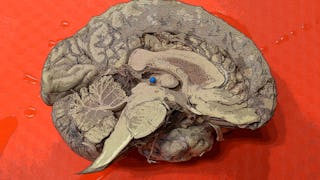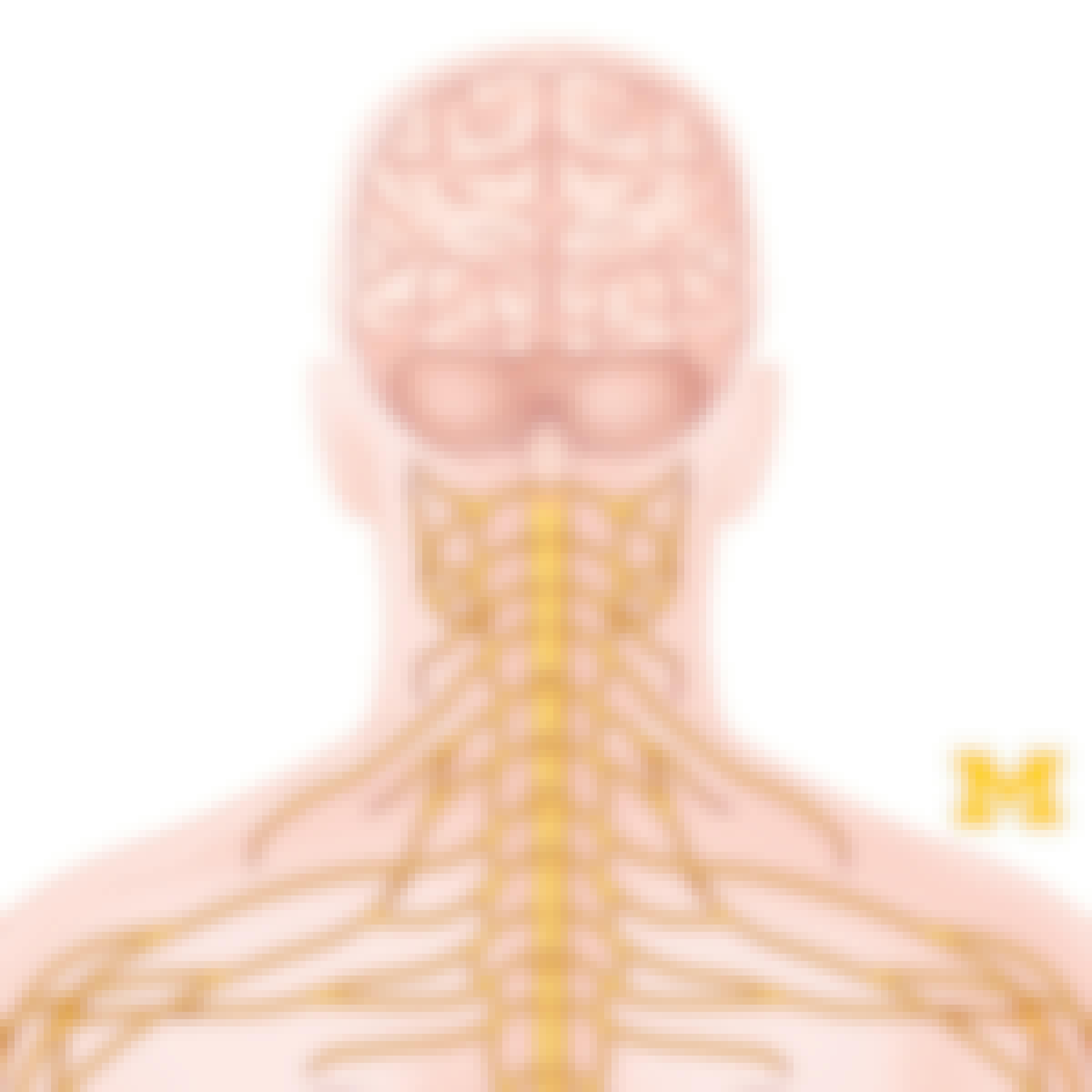Filter by
SubjectRequired
LanguageRequired
The language used throughout the course, in both instruction and assessments.
Learning ProductRequired
LevelRequired
DurationRequired
SkillsRequired
SubtitlesRequired
EducatorRequired
Explore the Neurology Course Catalog
 Status: Preview
Status: PreviewDuke University
Skills you'll gain: Neurology, Physiology, Anatomy, Cell Biology, Psychology, Pathology, Molecular Biology
 Status: Preview
Status: PreviewThe University of Chicago
Skills you'll gain: Neurology, Physiology, Anatomy, Behavioral Health, Mental and Behavioral Health, Mental Health Diseases and Disorders, Vital Signs, Control Systems, Coordination, Biology, Communication Systems
 Status: Free Trial
Status: Free TrialJohns Hopkins University
Skills you'll gain: Magnetic Resonance Imaging, Neurology, Medical Imaging, Diagnostic Radiology, Anatomy, Radiology, X-Ray Computed Tomography, Experimentation, Research Design, Biomedical Technology, Image Analysis, Physiology, Medical Terminology

Yale University
Skills you'll gain: Anatomy, Neurology, Human Musculoskeletal System, Respiration, Physiology, Radiology, Surgery
 Status: Free Trial
Status: Free TrialJohns Hopkins University
Skills you'll gain: Magnetic Resonance Imaging, Neurology, Medical Imaging, Diagnostic Radiology, Anatomy, Image Analysis, Data Analysis, X-Ray Computed Tomography, Correlation Analysis, Data Manipulation, Radiology, Analytical Skills, Experimentation, Research Design, Statistical Analysis, Biomedical Technology, Advanced Analytics, Network Analysis, R Programming, Statistics
 Status: NewStatus: Free Trial
Status: NewStatus: Free TrialUniversity of Cambridge
Skills you'll gain: Childhood Education and Development, Human Learning, Child Development, Psychology, Teaching, Decision Making, Learning Theory, Instructional Strategies, Learning Strategies, Empathy, Neurology, Magnetic Resonance Imaging, Disabilities, Autism Spectrum Disorders, Medical Imaging, Special Education, Electrophysiology, Differentiated Instruction, Human Development, Non-Verbal Communication
What brings you to Coursera today?

Yale University
Skills you'll gain: Diagnostic Radiology, Medical Imaging, Radiography, X-Ray Computed Tomography, Medical Ultrasonography, Magnetic Resonance Imaging, Diagnostic Tests, Neurology, Image Analysis, Anatomy
 Status: Free Trial
Status: Free TrialUniversity of Michigan
Skills you'll gain: Human Musculoskeletal System, Anatomy, Endocrinology, Pulmonology, Cardiology, Respiration, Gynecology, Hematology, Obstetrics And Gynecology, Orthopedics, Neurology, Urology, Nephrology, Kinesiology, Physiology, Medical Imaging, Sports Medicine, Biology, Medical Terminology, Cell Biology
 Status: Preview
Status: PreviewYale University
Skills you'll gain: Psychology, Child Development, Psychiatry, Mental Health, Human Development, Human Learning, Social Sciences, Behavioral Health, Sociology, Neurology, Critical Thinking, Scientific Methods, Problem Solving
 Status: Free Trial
Status: Free TrialUniversity of Michigan
Skills you'll gain: Anatomy, Neurology, Physiology, Medical Terminology
 Status: Free Trial
Status: Free TrialSkills you'll gain: Medical Terminology, Pulmonology, Pathology, Endocrinology, Cardiology, Medical Records, Respiratory Therapy, Neurology, Obstetrics And Gynecology, General Medical Tests and Procedures, Diagnostic Tests, Urology, Gynecology, Anatomy, Human Musculoskeletal System, Health Information Management and Medical Records, Cell Biology, Orthopedics, Physiology, Immunology
 Status: Free Trial
Status: Free TrialJohns Hopkins University
Skills you'll gain: Research Design, Science and Research, Laboratory Research, Research Methodologies, Research, Consumer Behaviour, Influencing, Marketing Psychology, Case Studies, Persuasive Communication, Statistical Analysis, Ethical Standards And Conduct, Data Analysis, Data Collection, Advertising, Behavioral Economics, Biomedical Technology, Experimentation, Neurology, Decision Making
Neurology learners also search
In summary, here are 10 of our most popular neurology courses
- Medical Neuroscience: Duke University
- Understanding the Brain: The Neurobiology of Everyday Life: The University of Chicago
- Fundamental Neuroscience for Neuroimaging: Johns Hopkins University
- Anatomy of the Head and Spine : Yale University
- Neuroscience and Neuroimaging: Johns Hopkins University
- The science of mind and decision making: University of Cambridge
- Visualizing the Living Body: Diagnostic Imaging: Yale University
- Anatomy: University of Michigan
- Introduction to Psychology : Yale University
- Anatomy: Human Neuroanatomy: University of Michigan










